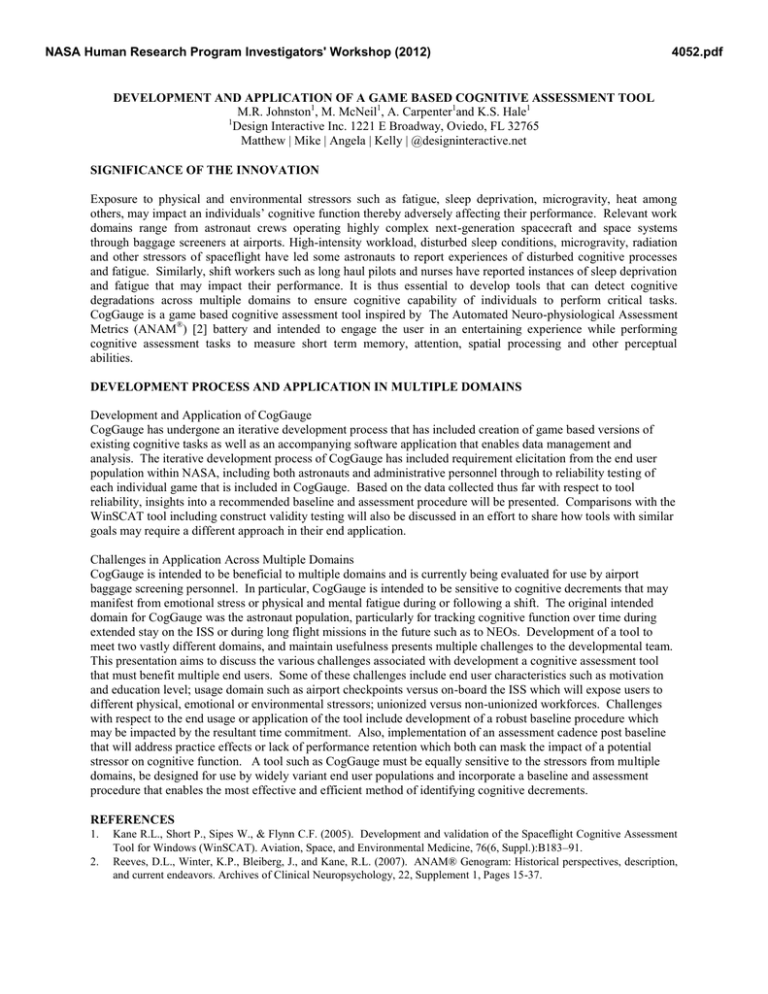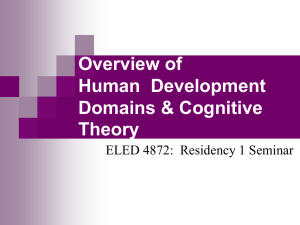DEVELOPMENT AND APPLICATION OF A GAME BASED COGNITIVE ASSESSMENT TOOL
advertisement

NASA Human Research Program Investigators' Workshop (2012) 4052.pdf DEVELOPMENT AND APPLICATION OF A GAME BASED COGNITIVE ASSESSMENT TOOL M.R. Johnston1, M. McNeil1, A. Carpenter1and K.S. Hale1 1 Design Interactive Inc. 1221 E Broadway, Oviedo, FL 32765 Matthew | Mike | Angela | Kelly | @designinteractive.net SIGNIFICANCE OF THE INNOVATION Exposure to physical and environmental stressors such as fatigue, sleep deprivation, microgravity, heat among others, may impact an individuals’ cognitive function thereby adversely affecting their performance. Relevant work domains range from astronaut crews operating highly complex next-generation spacecraft and space systems through baggage screeners at airports. High-intensity workload, disturbed sleep conditions, microgravity, radiation and other stressors of spaceflight have led some astronauts to report experiences of disturbed cognitive processes and fatigue. Similarly, shift workers such as long haul pilots and nurses have reported instances of sleep deprivation and fatigue that may impact their performance. It is thus essential to develop tools that can detect cognitive degradations across multiple domains to ensure cognitive capability of individuals to perform critical tasks. CogGauge is a game based cognitive assessment tool inspired by The Automated Neuro-physiological Assessment Metrics (ANAM®) [2] battery and intended to engage the user in an entertaining experience while performing cognitive assessment tasks to measure short term memory, attention, spatial processing and other perceptual abilities. DEVELOPMENT PROCESS AND APPLICATION IN MULTIPLE DOMAINS Development and Application of CogGauge CogGauge has undergone an iterative development process that has included creation of game based versions of existing cognitive tasks as well as an accompanying software application that enables data management and analysis. The iterative development process of CogGauge has included requirement elicitation from the end user population within NASA, including both astronauts and administrative personnel through to reliability testing of each individual game that is included in CogGauge. Based on the data collected thus far with respect to tool reliability, insights into a recommended baseline and assessment procedure will be presented. Comparisons with the WinSCAT tool including construct validity testing will also be discussed in an effort to share how tools with similar goals may require a different approach in their end application. Challenges in Application Across Multiple Domains CogGauge is intended to be beneficial to multiple domains and is currently being evaluated for use by airport baggage screening personnel. In particular, CogGauge is intended to be sensitive to cognitive decrements that may manifest from emotional stress or physical and mental fatigue during or following a shift. The original intended domain for CogGauge was the astronaut population, particularly for tracking cognitive function over time during extended stay on the ISS or during long flight missions in the future such as to NEOs. Development of a tool to meet two vastly different domains, and maintain usefulness presents multiple challenges to the developmental team. This presentation aims to discuss the various challenges associated with development a cognitive assessment tool that must benefit multiple end users. Some of these challenges include end user characteristics such as motivation and education level; usage domain such as airport checkpoints versus on-board the ISS which will expose users to different physical, emotional or environmental stressors; unionized versus non-unionized workforces. Challenges with respect to the end usage or application of the tool include development of a robust baseline procedure which may be impacted by the resultant time commitment. Also, implementation of an assessment cadence post baseline that will address practice effects or lack of performance retention which both can mask the impact of a potential stressor on cognitive function. A tool such as CogGauge must be equally sensitive to the stressors from multiple domains, be designed for use by widely variant end user populations and incorporate a baseline and assessment procedure that enables the most effective and efficient method of identifying cognitive decrements. REFERENCES 1. 2. Kane R.L., Short P., Sipes W., & Flynn C.F. (2005). Development and validation of the Spaceflight Cognitive Assessment Tool for Windows (WinSCAT). Aviation, Space, and Environmental Medicine, 76(6, Suppl.):B183–91. Reeves, D.L., Winter, K.P., Bleiberg, J., and Kane, R.L. (2007). ANAM® Genogram: Historical perspectives, description, and current endeavors. Archives of Clinical Neuropsychology, 22, Supplement 1, Pages 15-37.





